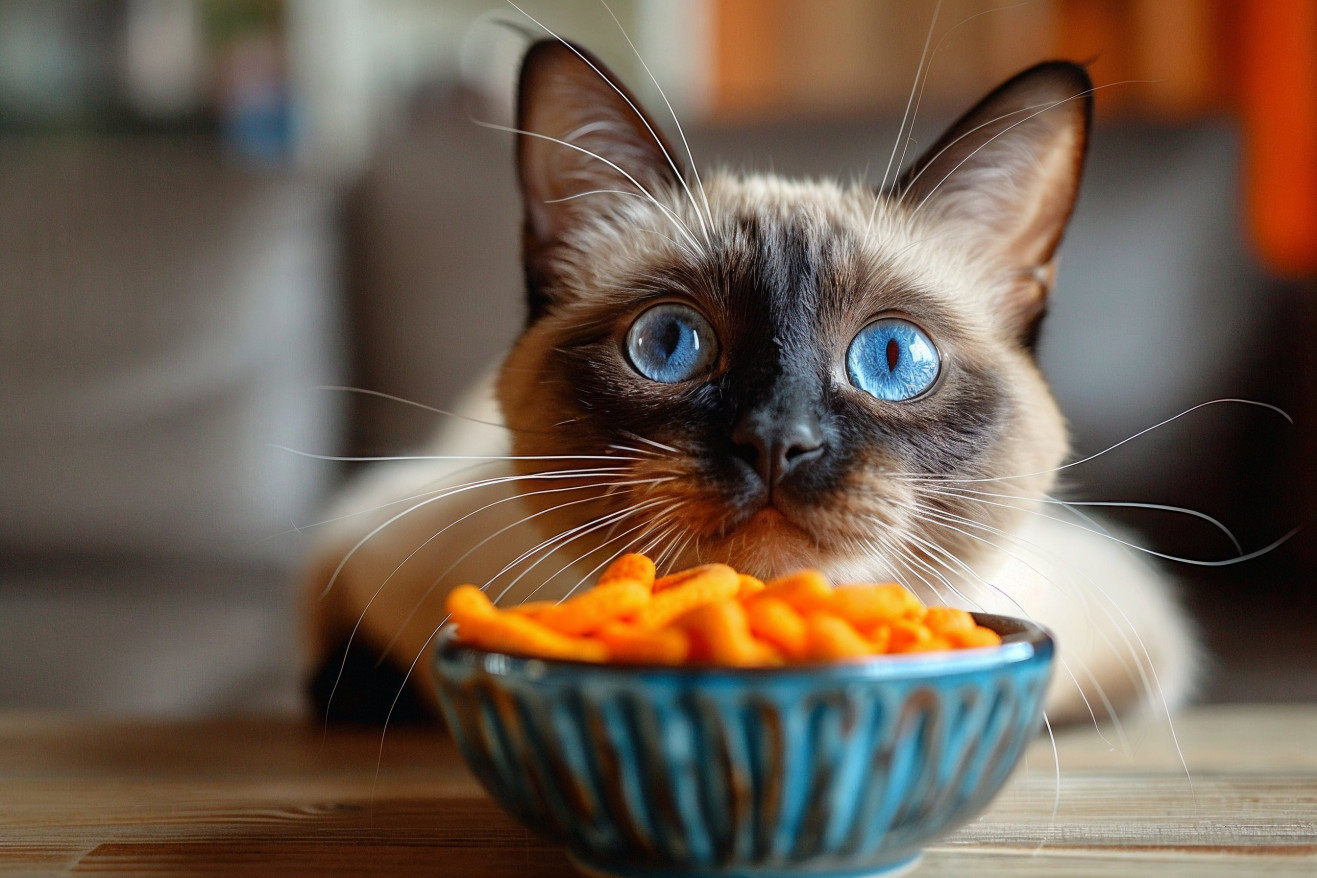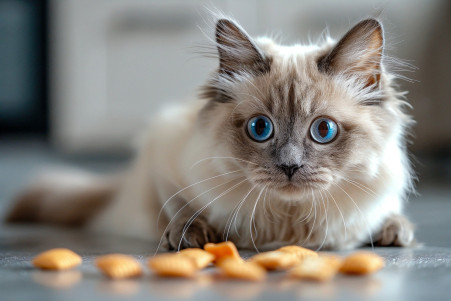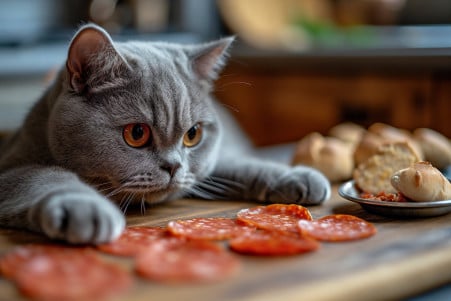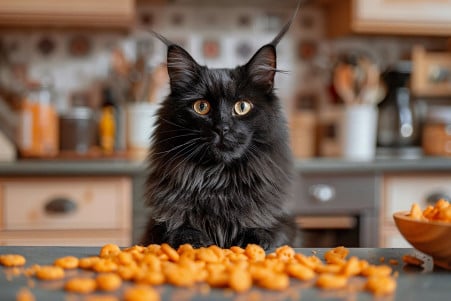Can Cats Eat Cheetos? Unpacking the Risks of Feline Snacking on Human Treats
14 March 2024 • Updated 13 March 2024

While Cheetos may be a delicious snack for humans, they are definitely not a good option for cats. Not only are they high in fat and sodium, but they also contain a number of artificial ingredients that can lead to digestive problems and other health issues. Cats need a well-balanced diet that’s formulated to meet their specific nutritional needs.
This article will delve into a wide variety of veterinary opinions and nutritional studies to explain why cats can’t eat snacks like Cheetos. This exploration will cover everything from the nutritional requirements of cats to the dangers of feeding them human food to the impact it can have on their health.
By examining these studies, we hope to provide a comprehensive view that will enable you to make the best dietary decisions for your cat.
Can cats eat Cheetos?
How to Create the Best Diet for Your Cat: What Cats Need to Eat
Cats have a specific set of nutritional requirements that are different from the needs of many other animals. According to the Cornell University College of Veterinary Medicine, cats are obligate carnivores, which means they need nutrients only found in animal tissues. This includes high levels of protein, moderate amounts of fat, and low levels of carbohydrates, as well as essential vitamins, minerals, fatty acids, and amino acids.
Animal protein is especially important in a cat’s diet because it provides essential amino acids like taurine, which is important for heart health and vision.
PetMD points out that a cat’s nutritional needs also change throughout their life cycle. For example, kittens need a diet that supports growth, while adult cats need a diet that supports maintenance, and older cats need a diet that can be adjusted to account for slower metabolism and other age-related health concerns.
According to VCA Animal Hospitals, cats need protein from animal tissues because it contains high levels of certain essential fatty acids and vitamins, including calcium and vitamin A.
A good diet for cats isn’t just about protein, it’s about the right balance of all of these nutrients to support their health and well-being in a way that’s consistent with their nature as carnivores. Cat owners need to know what these requirements are so they can avoid common dietary pitfalls and make sure their cats get the nutrients they need.
Health Consequences of Giving Cats Human Junk Food
While it might be tempting to let your cat in on your favorite snack, when it comes to human junk food like Cheetos, you are putting your cat at risk for a number of health consequences. According to PetMD, many human foods are even toxic to cats. In addition to that, giving your cat these kinds of snacks can lead to digestive upset, including vomiting, diarrhea, and a loss of appetite.
The high fat and calorie content of snacks like Cheetos can also lead to obesity in cats, which can cause a number of health problems including diabetes and arthritis. In addition, the artificial flavors, colors, and preservatives found in these snacks can have negative or unknown consequences for cats, who have not evolved to process these kinds of chemicals.
To keep your cat healthy, stick to treats that are specifically formulated for cats and their dietary needs. Not only are these treats safe, but they also provide nutrients that are in line with a cat’s carnivorous diet, which can help support their overall health and well-being. By choosing these options, you can help support your cat’s health while avoiding the risks associated with human junk food.
How Cats Digest Food
Cats have a unique digestive system that is designed to process animal-based proteins. Their teeth and digestive system have evolved to efficiently break down meat, and as a result, a cat’s digestive system, which takes between 10 and 24 hours to complete the process, is set up to handle the fibrous texture of meat.
This is why cats can get everything they need from a diet that includes animal tissues that are rich in nutrients like taurine and arachidonic acid.
On the other hand, cats are not well-equipped to handle high-fat and high-sodium diets. A study published in the journal PMC found that even in older cats, who are more likely to have health issues, there was no evidence that high sodium intake led to systemic hypertension. However, the study did not look at the broader impact on the digestive system, so there may be other issues with these types of diets.
When it comes to feeding cats, this means that introducing non-traditional foods like Cheetos can lead to digestive problems. Cats can’t digest plant material and high-fat foods well, and as a result, feeding them these kinds of snacks can lead to blockages. This is why it’s important to make sure that cats are fed a diet that’s rich in animal-based proteins and that they aren’t given human snacks that don’t match their digestive needs.
Navigating the World of Artificial Additives in Cat Food
While pet food has become more sophisticated, with artificial flavors and colors being used to attract pet owners, the question of how these additives affect cats is still up for debate. GlobalPETS cited a critical review that pointed out that there may be health effects that have been overlooked in the use of certain artificial flavoring agents, including cinnamic aldehyde and monosodium glutamate, that could be harmful to cats.
The controversy also extends to the use of pyrophosphates in cat food, since a study by Dobenecker et al. found that an oversupply of inorganic phosphorus can lead to chronic kidney disease, especially in cats. This research shows that pet food companies need to be more careful about the additives they use in their products.
Meanwhile, Boneitup warned that artificial additives may be linked to health problems like cancer, allergies, and immune system suppression. This is particularly concerning since cats have a shorter life expectancy, which means that the effects of consuming artificial additives over many years could be more pronounced, suggesting that pet owners should be cautious about feeding them to their cats.
For cat owners who want to make sure that they’re doing everything they can to protect their pets’ health, this may mean making their own cat treats or looking for commercial options that don’t include any of the controversial additives.
By looking for natural ingredients and clear labels, pet owners can steer clear of artificial additives and help ensure that their cats are as healthy as possible, leading to a healthier life for cats and their human family members.
How to Feed Your Cat: Expert Insights on Cat Feeding Practices
When it comes to feeding practices for cats, expert advice is consistent: focus on a well-balanced diet that meets the specific nutritional needs of cats. As noted by CatTime, it’s always a good idea to talk to a vet before giving your cat human food, including Cheetos. Vets help pet parents make sure they are feeding their cats the right foods to meet their nutritional needs and live a healthy life.
If you want to add something new to your cat’s diet, it’s important to do so slowly, so you can make sure your cat tolerates it well.
If you’re thinking about giving your cat some of your snack, keep in mind that even a small amount of a high-fat, high-sodium product like Cheetos can lead to weight gain and other health issues, so it’s best to avoid them, according to the experts.
Instead, opt for treats that are made specifically for cats that you can use to supplement their regular diet without replacing their main source of nutrition.
Following these feeding practices and tips will help ensure that your cat’s diet is safe and supports their long-term health and wellness.
Final Thoughts: Cat Nutrition and the Dangers of Human Junk Food
In summary, we’ve covered a lot of ground in the world of cat nutrition, but one thing is clear: human junk food, especially Cheetos, is not the way to go when it comes to treating your cat. The high fat, salt, and artificial content in these snacks can lead to a variety of health problems in cats, from an upset stomach to obesity and even toxicity.
Since cats are obligate carnivores, their diet should not include the artificial and unhealthy ingredients that are found in many human junk foods. We’ve also learned from the perspective of veterinarians how important it is for cats to get the right nutrition, including the right balance of vitamins and minerals, at every stage of their lives.
Cat parents can get the help they need to make sure they’re feeding their cats the right food from veterinarians. By working with vets, cat parents can make sure that their cats are getting the nutrition they need to stay healthy and happy.
Being aware of and meeting the nutritional needs of our pets is part of being a responsible pet owner. After all, responsible cat feeding isn’t just about what cats like to eat, it’s about what they need to eat to be healthy and thrive.


